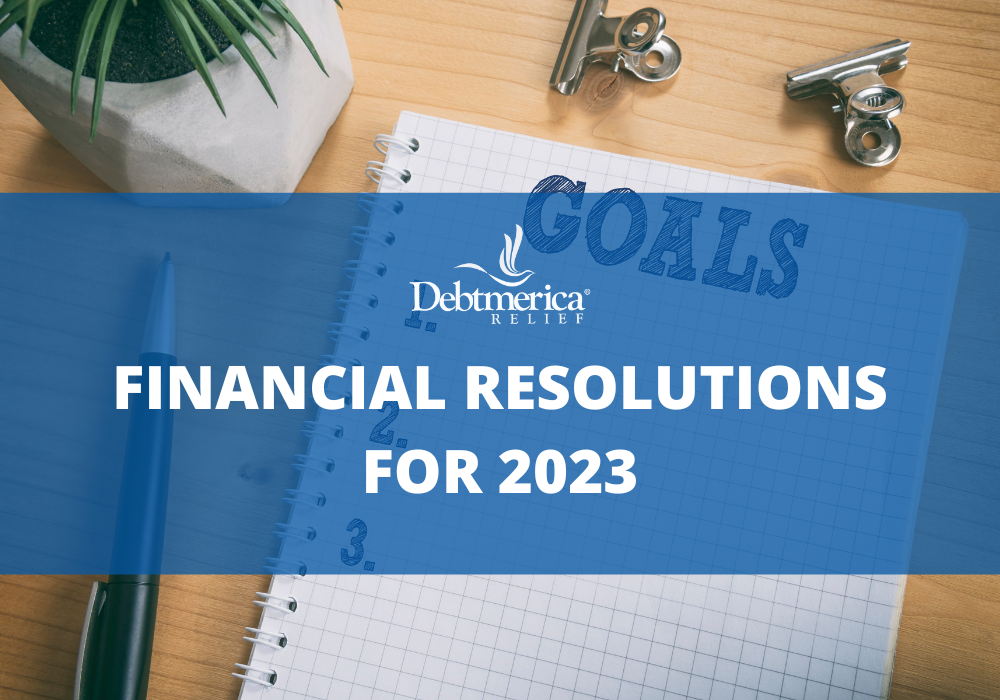Financial Resolutions for 2023

With higher interest rates, now is the time to get serious about your finances. At least some of your income should be going towards savings or debt, and both if your budget will allow it. Here are some financial resolutions you can make for 2023.
Reevaluate (Or Create) Your Budget
When was the last time you reevaluated your budget? While you’re probably roughly familiar with how many expenses you have each month, it’s important to know where every dollar you earn goes. If you have a budget – great! You can work off your current budget and update it according to new goals you have or your new gross income if it has changed in the last year. If you don’t have a budget already, don’t worry. There are several popular budgeting styles to choose from, including the 50/30/20 budget or the zero-based budget.
The 50/30/20 budget allocates 50% of your after-tax income towards necessities, like housing and groceries. 30% is for discretionary expenses, or things you want but do not necessarily need. These things might include your Netflix account, snacks or hobby supplies. The final 20% should go towards savings and debt, not including your minimum payments on credit cards since those are necessary and should be included in your 50% category. This strategy can help reevaluate your lifestyle and help pay down debt or save faster.
The zero-based budget is one that requires you to allocate every dollar you earn on something. You can start by creating budget categories, like bills, debt, gas, groceries, and fun spending money. Then you will allot every dollar of your paycheck to a certain category however you see fit. You should do this until you have zero dollars leftover.
If you’re new to budgeting, it might be best to use a traditional budget, in which you subtract your monthly expenses from your monthly income. Then take what is leftover to either spend, save or pay off debt. In any case, a budget will be key to achieving any financial goals you make this year.
Build an Emergency Fund
If your budget will only allow you to contribute to either savings or debt for now, it’s key to make sure your emergency savings fund is sufficient first. A 2021 study found that more than half of Americans have less than three months’ worth of covered expenses saved, while 25% said they had no emergency fund at all. A good starting point is to save at least three months’ worth of pay, or six months’ worth of living expenses to help keep you afloat during job loss or surprise medical bills, and more. So how do you accomplish this? You can automate your savings so that a certain percentage of your paycheck goes directly into your savings account. If you can afford to put 10% or more of your income into savings, you should. If not, you can do whatever is affordable to you.
Pay Down Your Debt
Your debt is more expensive than it has been in years because of rising interest rates. The average credit card interest rate today is around 21% and the rate is likely higher if you don’t have the best credit score. If you are carrying a lot of debt right now, your first step should be to reevaluate your budget. See where you can cut down expenses and then reallocate those funds to debt repayment. It might also be worth getting a side job to help pay off your debt as quickly as possible.
Save for Retirement
Retirement savings are often overlooked or pushed aside until a later time. Financial giant Fidelity Investments recommends having at least the equivalent to your salary by age 30, three times your salary by age 40, six times by age 50, eight times by 60, and 10 times by 67. If you’re one of the Americans who feels like they are behind on retirement savings, you’re not alone. In fact, over half of Americans feel this way. You can’t make up for lost time, but you can start saving immediately to start compounding interest now. This is especially true if your employer matches your retirement contributions. Financial experts say that you should try to put 5% to 10% of your gross income towards retirement savings.
Debt Relief in 2023
Maybe your 2023 New Year’s resolution was related to your finances, like saving for a vacation or paying off one credit card. Even something as simple as saving a little bit of each paycheck requires a plan and commitment. It’s understandable that saving can seem impossible if you have debt that has become unmanageable and stressful. Debtmerica Relief has over 16 years of experience in providing relief to our clients whose financial burdens have become too much to handle. If you need help with debt, give us a call at 800-470-8155 for a free consultation.



